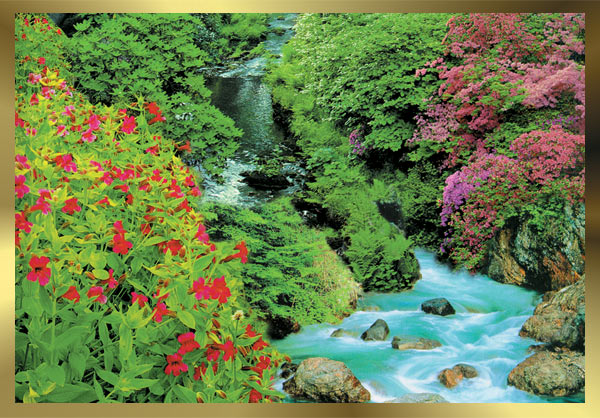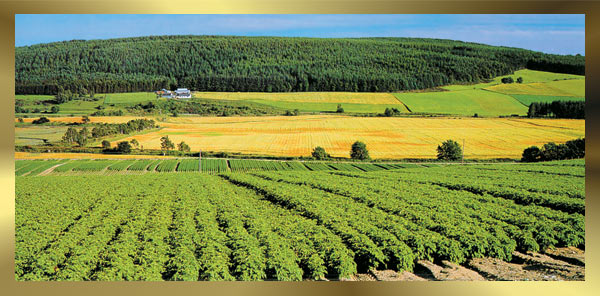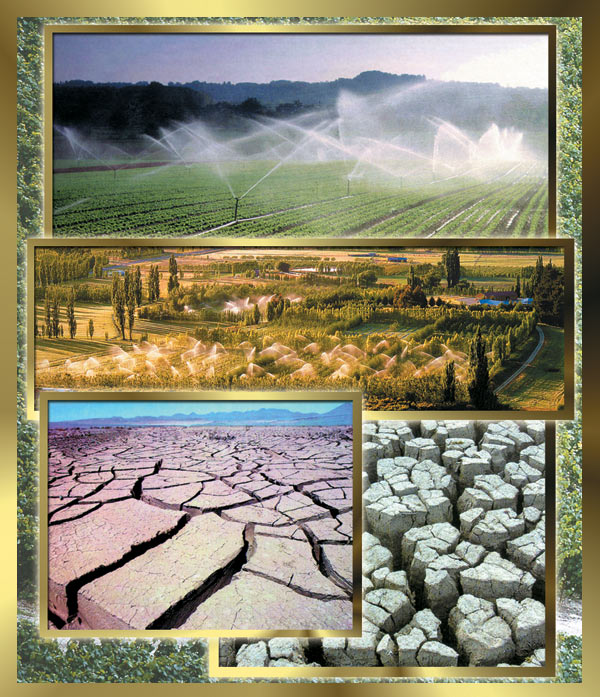This verse describes the endless gifts of Paradise that are given as a reward to those believers who strive to please Allah by doing good. Allah has promised Paradise to the believers in many verses. For instance, the following verse informs us that the believers will be welcomed warmly and sent in companies to Paradise:
Gardens of Eden that they enter, with rivers flowing under them, where they have whatever they desire. That is how Allah repays those who do their duty, those whom the angels take in a virtuous state. They say: "Peace be upon you. Enter the Garden for what you did." (Surat an-Nahl, 31-32)
 |
Following this honorable welcome, Allah bestows upon them countless gifts. But above all of these gifts will be the believers' spiritual joy of having won Allah's good pleasure and Paradise. While the unbelievers will be suffering in the punishing Fires of Hell and enduring inexplicable remorse, the believers will be leading their lives as servants having won His good pleasure and love. Contrary to Hell, which will be tight and crowded, the believers will rest in "a Garden whose breadth is like that of Heaven and Earth combined" (Surat al-Hadid, 21) in Paradise, where they will see beauty and a great kingdom all around. They will recline on couches lined with rich brocade, enjoy easily picked fruit, reside in palaces with rivers flowing under them, sit on high-raised thrones, and converse with one another. There will be cool shades in Paradise, which Allah describes as a place that is neither too cool nor too hot.
 |
As described in Surat al-Kahf 31, the green clothing worthy of the people of Paradise is made of the finest silk and rich brocade. In addition, they will wear golden bracelets. Besides beautiful clothing, the people of Paradise will be provided with delicious foods and drinks. Specifically, the Qur'an mentions a variety of fruit, the flesh of any fowl that they may desire, tasty drinks, dates and pomegranates without equal, fruit-laden lote trees, and bananas piled bunch on bunch. And these are just some of Allah's promised gifts.
Furthermore, there will be only beauty in Paradise, for people of Paradise will no longer need to endure anything with patience, as we do in this world. There will be an environment full of endless beauty without any tiredness, fear, sorrow, or any other conceivable trouble. Allah reveals Paradise's beauty, as follows:
An image of the Garden promised to those who guard against evil: In it are rivers of water that will never spoil, rivers of milk whose taste will never change, rivers of wine that are delightful to all who drink it, and rivers of honey of undiluted purity. In it they will have fruit of every kind and forgiveness from their Lord… (Surah Muhammad, 15)
Allah has detailed the gifts of Paradise and the sufferings of Hell in the Qur'an. Those who pretend not to understand the truth will be losers in both worlds. For this reason, people should seriously prepare and strive for the Hereafter in order to win our Lord's unique gifts, as the following verse makes clear:
That abode of the Hereafter—We grant it to those who do not seek to exalt themselves in the land or to cause corruption in it. The successful outcome is for those who guard against evil. (Surat al-Qasas, 83)
By relating this parable, Allah wants people to compare a believer with someone who claims to believe in Allah but who is, in reality, an unbeliever. One of the garden owners is richer than the other, a "superiority" that caused him to become arrogant and proud toward Allah.
But Allah, Who created everything out of nothing, is the sole owner of all that exists and tests some people by giving them wealth and property. Some people become ungrateful because they consider this wealth and property to be the fruit of their own effort and intellect. They exult in their possessions and make them a source of pride and prestige among people. On the other hand, sincere believers behave in the following manner:
Say: "O Allah! Master of the Kingdom. You give sovereignty to whoever You will, and You take sovereignty from whoever You will. You exalt whoever You will, and You abase whoever You will. All good is in Your hands. You have power over all things. (Surah Al `Imran, 26)

The ungrateful garden owner claimed that the gardens and their produce belonged to him, forgetting that they were only a gift and a test from Allah. He succumbed to a fierce pride and a blatant arrogance, as revealed in the following verses:
Do not strut arrogantly about the land. You will certainly never split the land apart, nor will you ever rival the mountains in height. All of that is evil action and hateful in the sight of your Lord. (Surat al-Isra', 37-38)
In many verses, Allah describes what will happen to such people, such as:
Fierce competition for this world distracted you until you went down to the graves. No indeed, you will soon know! Again, no indeed, you will soon know! No indeed, if you only knew with the Knowledge of Certainty, you will certainly see the Blazing Fire! Then you will certainly see it with the Eye of Certainty. Then you will be asked that Day about the pleasures you enjoyed. (Surat at-Takathur, 1-8)
This ungrateful person clearly displayed his disrespect for Allah by asserting that no disaster would ever touch his gardens. In short, he claimed a kind of godhood for himself.
But only Allah, Who created time and space and is beyond them, is endless. Allah's name Al-Khaliq (the Creator) has the inherent meaning of: the One Who creates everything from nothing and creates all things with the knowledge of what will happen to them. Every stage of each person, from the first moment of existence until the moment death, exists in Allah's presence. In Allah's guardianship (hifz), everything remains as it is, for He created everything that each person experienced or saw, and every detail of their lives. Nothing is ever lost, as the following verse informs us: "That is so you will know that Allah knows what is in the heavens and in Earth, and that Allah has knowledge of all things" (Surat al-Ma'ida, 97).

Since Allah is not subject to time, everything occurs for Him and meets its destination all at once. But people, who are subject to time, divide their lives into past, present, and future. However, such a division applies only to humanity, for what we consider the "past" is the "past" only to us, and what we consider the "unknowlable future" is the "unknowable future" only to us. Given that Allah is our Creator, our ordering of time cannot be applied to Him, a fact revealed by the following verse:
[Luqman said:] "My son, even if something weighs as little as a mustard-seed and is inside a rock or anywhere else in the heavens or Earth, Allah will bring it out. Allah is All-Pervading, All-Aware. (Surah Luqman, 16)
For Allah, all events occur in one moment. The examples given from the lives of Musa (as), the Companions of the Cave, Khidhr (as), Dhu'l-Qarnayn (as), Muhammad (saas), and all of the other Prophets, as well as of our own time, are all like one moment in His presence. Our grandchildren, even their grandchildren, and the lives of all the people who will come after them also occur in the same moment. In Allah's presence, the Hour has taken place and the people have gone to their eternal abode already. Those who believe in Allah are in Paradise, and those who do not are suffering in Hell.
According to a widespread but false belief, Allah has created humanity, given its members a certain amount of time, awaits the results of their trials, and will continue to wait until the universe dies. (We hold Allah above this.) But in reality, it is inconceivable for Allah to wait, for waiting is a human characteristic whereas Allah is beyond and above all imperfections of humanity. Allah's name Al-Quddus (The Holy) means that He is free from all error, weakness, shortcoming, heedlessness and from any kind of defect. He encompasses all people's past and future, and the details of all their life experiences. But people believe that time, as they understand it here, flows from the past (before) toward the future (after), whereas in Allah's presence such words and concepts do not exist. Everything, all people and all living beings, live all at once. All times, eras, periods, histories, and even all days, hours, and minutes, are present in the same moment. Even if the limited intellectual capacity of people prevents them from seeing this truth, this reality is clear.
This is the main reason why believers appreciate Allah's might and so submit to and trust in Him. They know that Allah encompasses them and everything else, that they are totally dependent upon Him, and that they are small next to His greatness.
Being able to appreciate Allah's greatness and power, and to comprehend the wisdom behind events and their fine details, believers submit to Allah willingly.
The verse "But if I should be sent back to my Lord, I will definitely get something better in return" (Surat al-Kahf, 36) describes people who believe that they will enter Paradise without observing the boundaries established by Allah or obeying His commands. Such people consider themselves exempt and are arrogant with Allah.
Many people say that they believe in Allah and the Qur'an, although they have no fear of Him. They do not obey Allah's commands, abide by what is lawful and unlawful, and do not follow the Messenger's (saas) path. And yet they have a strong faith that they will go to Paradise after they die.
On the other hand, the believers hope for Paradise but fear Hell: "those who affirm the Day of Judgment, those who are fearful of the punishment of their Lord (no one is safe from the punishment of his Lord)" (Surat al-Ma`arij, 26-28). This attitude is pointed out in: "Call on Him fearfully and eagerly. Allah's mercy is close to the good-doers" (Surat al-A`raf, 56). Believers behave in this way because no one can be certain that he or she will not enter Hell, but all of them know that the unbelievers will certainly suffer its fierce punishment:
Do they feel secure that the all-enveloping punishment of Allah will not come upon them, or that the Last Hour will not come upon them all of a sudden, when they least expect it? (Surah Yusuf, 107)
Do those who plot evil actions feel secure that Allah will not cause the land to swallow them up or that a punishment will not come upon them from where they least expect? (Surat an-Nahl, 45)
This verse provides guidance on how believers should behave when inviting others to good morality or when reminding people of Allah. If the people with whom they are talking have forgotten their helplessness before Allah and have become arrogant, the best thing to do is to remind them of their helplessness.
The other garden owner, being a man of faith, invites the arrogant owner to faith by reminding him that he was "created from dust and a drop of sperm." Clearly, if Allah wills it, this invitation could have a positive effect on this person. The faithful garden owner realized his neighbor's weak faith and perceived the need to provide support. To explain Allah's signs in nature is one of the best ways to strengthen another person's faith.
The speech of the arrogant garden owner differs from the speech of a Muslim. In fact, it evokes the style of an unbeliever. This is why the faithful garden owner begins his question with "Do you not, then, believe in Him?" The other person might not be openly proclaiming his unbelief, but his words clearly show that he does not believe with certainty. Although he professes belief with his words, and yet he does not actually abide by Allah's law. This contradiction means that he denies Allah.
One often meets these self-contradicting people. Most people say they believe in Allah, but they do not lead a life that pleases Him. Instead, they act contrary to the Qur'an's morality and do not follow in the Prophet's (saas) footsteps. Despite their words and deeds, which amount to denial, they consider themselves righteous and destined for Paradise. But they are only deceiving themselves, for Allah says that:
As for those who denied Our Signs and the encounter of the Hereafter, their actions will come to nothing. Will they be repaid except for what they did? (Surat al-A`raf, 147)

Throughout Surat al-Kahf, Allah points out that the majority of people ascribe partners to Him. In the Qur'an, denial by association means to prefer anybody, anything, or any idea over Allah, or to consider them equal and to act accordingly. The Qur'an calls this "setting up other gods together with Allah." In truth, this means to choose a purpose in life contrary to Allah's good pleasure, to seek salvation from or the pleasure of any other being, or to hold anything in higher esteem than Allah.
People need to refrain from such a sin, for Allah warns humanity that while He will forgive all other sins, if He wills to do so, He will never forgive this particular sin (Surat an-Nisa', 116). Obviously, Muslims will want to avoid such a great sin at all costs. Prophet Luqman (as) advised his son as follows: "My son, do not associate anything with Allah. Associating others with Him is a terrible wrong" (Surah Luqman, 13). Another reason why this sin is so great is that it causes good deeds to be erased, which leads to ultimate loss. The Qur'an reveals this:
It has been revealed to you and those before you: "If you associate others with Allah, your actions will come to nothing, and you will be among the losers." (Surat az-Zumar, 65)
Given the above, all who ascribe partners to Allah will end up in Hell, unless they sincerely repent and embrace, and then adhere to, His religion. This is why those who are in awe of Allah's glory must be aware of this danger.
This verse indicates the importance of "ma sha' Allah" (It is as Allah wills). Believers use it to express their respect when regarding the superior art and power of Allah's creation.
Using this expression in a heartfelt manner reminds others that Allah owns all things, that everything happens in according to destiny, and that only He can will anything to happen. No doubt, such reminders are beneficial, for people easily forget their own helplessness and descend into ignorance.
For example, the unbelieving garden owner is ascribing partners to Allah by stating that he owns all of the property. Even though he does not clearly express his denial, "hidden association" is inherent in his words and behavior. Thus his friend warns him about ascribing partners to Allah and reminds him that everything belongs to Allah.
| [Turn, then, away from all that is false], turning to Him alone. Heed Him and establish prayer. Do not be one of those who associate [others with Him]. (Surah Rum, 31) | ||
Especially in our own time, people must always be aware of this danger, for such situations occur frequently. For instance, Al-Ghani (The Rich, He Who is free from need) is one of Allah's attributes, but the same word is used to describe people. There is no objection in using this term to describe someone's financial status, but it can turn into association if one considers his or her self, intellect, or effort to be the cause of this wealth.
This being the case, people easily forget, as did the unbelieving owner of the garden, that Allah is the true owner of all wealth. They also forget that just as He, the only One Who is "ghani" (rich), gave them whatever they own, He can take everything away if He wills. Such people adopt a truly crude attitude and mentality, which amounts to associating others with Allah. As a result, they will not realize that everybody other than Allah is poor and helpless, and that Allah can affect any one of His servants with any part of His attributes. Looking at things from such a perspective and acting accordingly leads to forgetting Allah's infinite power and rule, and to associating oneself with Him.
The right attitude is to know that Allah is the true owner of all wealth, to acknowledge that He is the sole governor of all that exists, and to be aware that He can remove the wealth that He gives at any time. One should not look at rich people in terms of whether they are rich or poor, but as servants of Allah to whom He has given wealth. For instance, if such people's families regard them as the true owners of their wealth, if all of their hopes rest on that person so that they forget that Allah is the Lord of all wealth and do not remind them of this reality, then their attitude would be truly misguided. Likewise, the employees of such people should not forget that Allah provides food, drink, and shelter. It would be a grave mistake to forget Allah and to consider one's employer as an independent power capable of many things. The Qur'an reveals the truth of such matters, as follows:
Instead of Allah, you worship only idols. You are inventing a lie. Those you worship besides Allah have no power to provide for you. So seek your provision from Allah, and worship Him and give thanks to Him. It is to Him you will be returned. (Surat al-`Ankabut, 17)
In these verses, the believing garden owner reminds his proud friend of his helplessness by pointing out that he cannot prevent any disaster sent by Allah, and that showing arrogance in the face of this reality is to be thoughtless.
One of the greatest mistakes of people whose property and wealth make them vain is to forget that these, like all the beauty on Earth, are only temporary. Beauty and youth eventually give way to old age, just as health makes way for illness, incapacity, and weakness.
As all wealth is only temporary, Allah can make a poor person rich and destroy the wealth of a rich person in an instant. People can lose their houses, yachts, cars, or jewelry in floods, earthquakes, or other disasters in a matter of moments. No one can prevent a disaster sent by Allah. Anyone can lose loved ones, die, become disabled, suffer permanent injury, or lose his or her memory and faculties, for: "No misfortune occurs except with Allah's permission" (Surat at-Taghabun, 11). Such events cannot be prevented, reversed, or delayed. On such a day, neither wealth nor property will be of any use, for: "As for those who disbelieve, neither their wealth nor their children will ever save them from Allah in any way." (Surah Al `Imran, 10)
 Someone who considers his possessions (e.g., yachts, villas, and other property) safe forever, realizes his hopelessness after a tornado. Allah gives power, wealth, health, and wellbeing to whomever He wills. He also lets people grow old to show them His Signs and to remind them that just as with all of the world's adornments, they cannot even control their own bodies. |
Since eveyone experiences only what Allah has ordained, they should submit to and trust in Allah. The garden owner, in his conceit, ignored this truth when he claimed that nothing bad would befall his gardens or their produce until the end of time. He was certain that the river watering his gardens would remain there forever, that no pest would ever attack his produce, and that he would not face drought or similar disasters. He felt that his wealth, intelligence, and effort would be enough to protect his property.
However, Allah can easily turn everything on its head. The river could drain into the ground due to a small-scale tremor. Such a thing can happen in the blink of an eye, rendering the land arid and unproductive. Who, other than Allah, could bring the river back or make this man's field productive once again? Certainly his property and even all of his wealth could not help him here. This is what he earns for his conceit and ungratefulness. Those material things that he valued and claimed ownership over, which caused him to invent lies against Allah and to ascribe partners to Him, will not help him in the Hereafter, for:
Woe to every faultfinding backbiter who has amassed wealth and hoarded it! He thinks that his wealth will make him live forever. No indeed! He will be flung into the Shatterer. And what will convey to you what the Shatterer is? The kindled Fire of Allah reaching right into the heart. It is sealed in above them in towering columns. (Surat al-Humaza, 1-9)
Surat al-Kahf 40-41 also refers to the great gift of Allah willing soothing underground water to rise to the surface. Had this not been so, people would be in great difficulty. But thanks to wells and other means that enable us to reach the clear and mineral-rich underground water, we can benefit from this gift.
